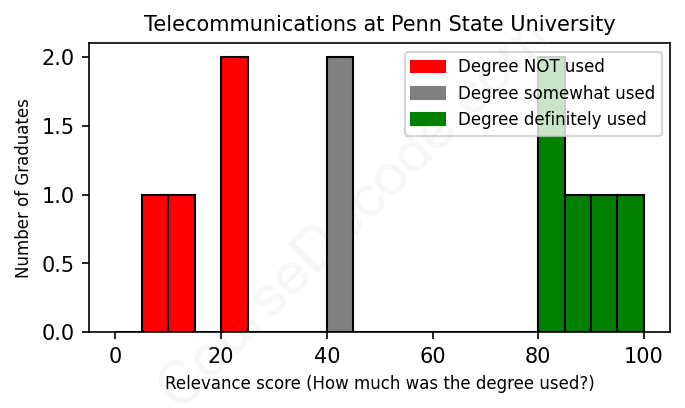
First, some facts. Of the Telecommunications graduates from Penn State University we've analyzed , here's how many have used (or NOT used) their degree in their career:

These are estimates based on AI analysis of 11 LinkedIn profiles (see below).
The verdict? Significantly below average. Overall, with an average relevance score of 53%, Telecommunications graduates from Penn State University have a much lower likelihood (-14%) of finding work in this field compared to the average graduate across all fields:
And for comparison, here's the chart for all profiles we've looked at across all degrees.
Also, after graduating, 36% of these graduates have pursued further education other than another Bachelor's degree (such as a Masters degree or other), compared to the average across all profiles of 35%. This suggests you may need more than just a Bachelors degree to be competitive as a Telecommunications graduate.
See the details:
|
Relevance score: 40% We think this person has NOT gone into a career related to their degree. We think this person has NOT gone into a career related to their degree.
DEGREE INFOGraduated in 2010 from Penn State University with a Bachelor's degree in Telecommunications. No other secondary education since. JOB HISTORY SINCE GRADUATIONCommercial Loan Processor Northwest Bank Apr 2014 - Apr 2016 Commercial Specialist  Rossbacher Insurance Group May 2016 - Present ABOUTNo information provided. |
The top 10 most common jobs done by the graduates we've analyzed (ranked most common to least) are:
Here is a visual representation of the most common words in job titles for Telecommunications graduates (this is across all Telecommunications graduates we've analyzed, not just those who went to Penn State University):

Based on the profiles of graduates from Penn State University with a degree in Telecommunications, it looks like their career trajectories are quite varied. Many of them started off in roles that relate to media, production, and broadcasting, like camera operators, technical directors, and media planners. For instance, those who graduated in the early 2010s often began in technical or production roles in media companies, which makes sense given the skill set developed during their studies. By the five-year mark, a good number of these graduates had moved into higher positions, often within the same or similar industries, with job titles like technical director or account manager in media and telecommunications firms. It's pretty common to see a progression where they build on their initial experiences to move into management or specialized roles.
However, it's worth noting that not everyone has followed a linear path directly related to telecommunications. Some graduates ended up in marketing and sales roles, showcasing the versatility of the skills they gained. While many have found success in fields connected to their degrees, a portion also veered into areas like insurance or general business roles. All in all, it seems like most graduates are carving out careers that utilize their telecommunications background, whether directly or indirectly, which is a promising sign for future students considering this field. So if you’re thinking about telecommunications, it appears to open up a range of career possibilities, which is pretty cool!
Getting a Bachelor’s degree in Telecommunications at Penn State can be a bit of a mixed bag. It’s definitely not the easiest degree out there, but it’s also not the hardest. You’ll dive into a lot of technical stuff like networking, signal processing, and media technologies, which can be pretty challenging if you’re not into math or techy subjects. That said, if you’re passionate about the field and stay on top of your coursework, it’s manageable. Plus, Penn State has a solid support system and resources like tutoring and study groups, so you won’t be alone in tackling the tougher classes. Overall, if you’ve got a genuine interest in telecommunications, you might find it a rewarding challenge rather than an overwhelming struggle.
Most commonly, in the LinkedIn profiles we've looked at, it takes people 4 years to finish a Bachelor degree in Telecommunications.
Looking at the jobs these Penn State graduates have held since finishing their degrees, it seems like a mixed bag when it comes to making good money. The 2010 graduate has been in relatively stable roles but might not be raking in the big bucks yet, while the 2013 grad moved up the ranks at QVC, probably earning a decent salary now as a Technical Director. Those from 2015 onward show a clear trend of moving up in their careers, especially with roles in media and marketing, which can pay well. For the most part, it seems like many of these folks are setting themselves up for solid careers, but there are definitely some who are still figuring things out and might not be making bank just yet.
Here is a visual representation of the most common words seen in the "about" section of LinkedIn profiles who have a Bachelor degree in Telecommunications (this is across all Telecommunications graduates we've analyzed, not just those who went to Penn State University). This may or may not be useful:

Here are all colleges offering a Bachelor degree in Telecommunications (ordered by the average relevance score of their Telecommunications graduates, best to worst) where we have analyzed at least 10 of their graduates:
| College | Score | Count |
|---|---|---|
 University of Florida University of Florida
|
64 | 10 |
 Penn State University Penn State University
|
53 | 11 |
 Ball State University Ball State University
|
50 | 13 |